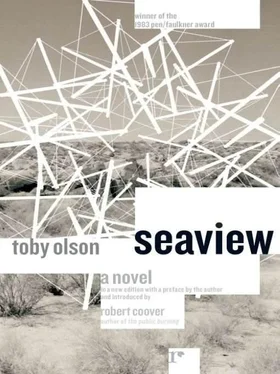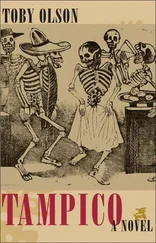“Good,” Steve said, “very good.” He smiled benignly, sipped at his whiskey and water, wiped his mouth delicately with his napkin. It was getting close to noon. Allen excused himself and went to call Melinda.
SHE HUNG UP AND WENT BACK TO HER POOLSIDE CHAIR at the table under the beach umbrella. There were two children at the shallow end playing in the water, a boy and a girl about seven and ten. Their mother lounged in the water up to her chest, leaning her back against the pool’s side, her arms resting on the edge. The children played well together, and the mother seemed relaxed; she watched, but she did not interfere or direct. Occasionally a high giggle would come from the girl when her brother splashed water at her, but their play never got too frantic. They had a float in the shape of a dolphin with an inflated ring that could be gotten inside of and a beach ball. At times the dolphin was used in their play, but at other times it bobbed off by itself, oddly commanding a space in the pool; moved by their wake, it often seemed ready to dive under the water. It stayed close to them, though the beach ball floated away at times.
There was a middle-aged man with a paunch, his wife next to him, sitting in a deck chair beside a poolside table. He was very white, and both he and his wife were sipping at tall drinks and watching the children play. One thin young girl lay in the sun on one of the beach lounges, getting her tan.
When she came back from the phone, the sun had shifted a little; but the walk back and forth had tired her, and in addition she was not worried about the longevity of her skin anymore, so she did not move the chair but let the sun hit her face and arms and her chest above her one-piece suit. “Wither away,” she said to herself. She was very thin, and she knew she looked good this way; she had always tried to keep her weight down, but in recent years she had been unsuccessful. When she fell ill, the weight had begun to drop off. After a while it had leveled off, and now she was the way she had always wanted to be. She thought of this as a fringe benefit. The major benefits included this trip, the fact that they had no money to speak of, and the fact that he could earn some through his skill: a skill connected to his body. This made him very desirable. Over the years she had not really known how little he thought of himself, though he spoke of what he felt as inadequacy in his work. He was a physical person who had denied that part of himself too much, and what he had been always desperate about, as she saw it, was the futile search for a body component in the mind work that he had to do for his teaching. The heart of the benefit was a time thing, very ironic of course. He had found his body when her need arose. She had found hers beneath the added weight she had carried. Her new body was the evidence of her need for him to connect to himself in the way he had. His body had gained some weight, all muscle, from his practice. She felt she had given him some flesh. They had a beginning, though it was near the end.
She did not think of the cancer as a foreign element in her anymore. What it had done was to make real the delicacy she had always asked him for in their sex. Sex with him before had always been a little desperate, as if he were reaching for something beyond and not in her; he always passed over what was there. Now that had changed, and she still had some hope that more inclusive change, the kind that would extend beyond the sex, was possible because of it. Her mind’s delicacy had become a delicacy of body; her weakness was physical. When they made love he was attentive to this. He lifted her and placed her carefully in different ways. She directed him and moved him by talking. He did not talk much while they were making love or otherwise, but she could see often, afterward, how overcome he was. They made love often, usually once a day, when she was up to it. She had not felt so alive in a long time. What is this thing called love, she thought. Making it, mostly. Much of the rest is dross. How good to feel so self-involved.
And she was reading a lot of books now, books she had always wanted to read. She read them with care and fine attention, and she learned a lot from them. But what she learned was not material to be used anywhere. She read them for what they contained because they had been written by people who knew how to write. She felt the purity of doing this, the sense of authentic leisure. She loved the books, and she loved him. She loved herself in her test of power, a test that she was passing. She almost thought she loved her foe, the cancer, too: it provided the good test. She had put her water colors and her oils away for good; she had no more interest in representation. She was having the best time of her life.
When the play of the children in the water became very quiet because their game now was about making small ripples with their hands, she heard the crunch in the gravel over her shoulder to her left. She turned her head and saw Bob White coming, wearing a golf cap and carrying a gunny sack.
She smiled, and he entered the gate of the fence surrounding the pool, walked over, put the sack on the pool deck, and sat in the chair beside her. He smiled and pointed to his cap as he looked at her. She laughed lightly.
“Nice,” she said. He nodded, very seriously.
“Good for the sun,” he said, and she laughed again.
“Very hot day,” he said. “I got some snakes here.” He tilted his head in a secret, conspiratorial manner in the direction of the bag. “Quite good to eat,” he said. “You ever fix snake?”
“No,” she said. “You?”
“No,” he said, “woman’s work.” But he smiled and added, “A very skillful and artful thing to do, I think. You wanna try it?”
“Absolutely,” she said.
He gathered her hat and purse for her and helped her up and into her robe. Then he gave her back her purse and picked up the gunny sack in his other hand. Then they went back to the room.
He had been there before he had gone to the pool. He had cleaned out their hibachi and put fresh charcoal under the grate, and he had placed the grill in the corner of the small patio outside the sliding glass doors in the rear of the room. Tucked under the edge of it, held so that breeze would not scatter them, were a few pieces of torn newspaper. Inside, over the formica counter to the right of the sink in the small mirrored alcove between the room and the bath, he had spread some newspaper with waxed paper over it. In the sink was a square plastic container with the name of the motel on its side, the ice bucket full of chipped ice. On the counter to the other side of the sink was more waxed paper, and on top of it, beside small restaurant packets of salt and pepper, was a small pile of odd-looking plant clippings. Among them was a tiny, delicate blue flower at the end of its own cut stem. His knife rested beside the clippings. It had a bone handle and looked like some kind of fish knife. Both the clippings and the knife blade were touched with drops of water from the washing he had obviously given them.
“What a beautiful little flower,” she said.
“Very beautiful,” he said. “Very good with snake.”
She was a very good cook, and he was very good with his knife. After he had put the snake meat in its bags on top of the ice and had hung the skins to dry over the latticework that separated the patios in back of the rooms, he began to work at the pile of clippings. He cut the small flower off first and put it to the side. Then he stripped some of the greener stalks of their side growths, putting them between his thumb and the blade at their bases, then squeezing and turning his wrists slightly. When he had finished this, he slit each stalk down the middle, revealing its greener inside; the stalks looked a little like leeks. Then he cut them in two-inch sections.
Читать дальше












